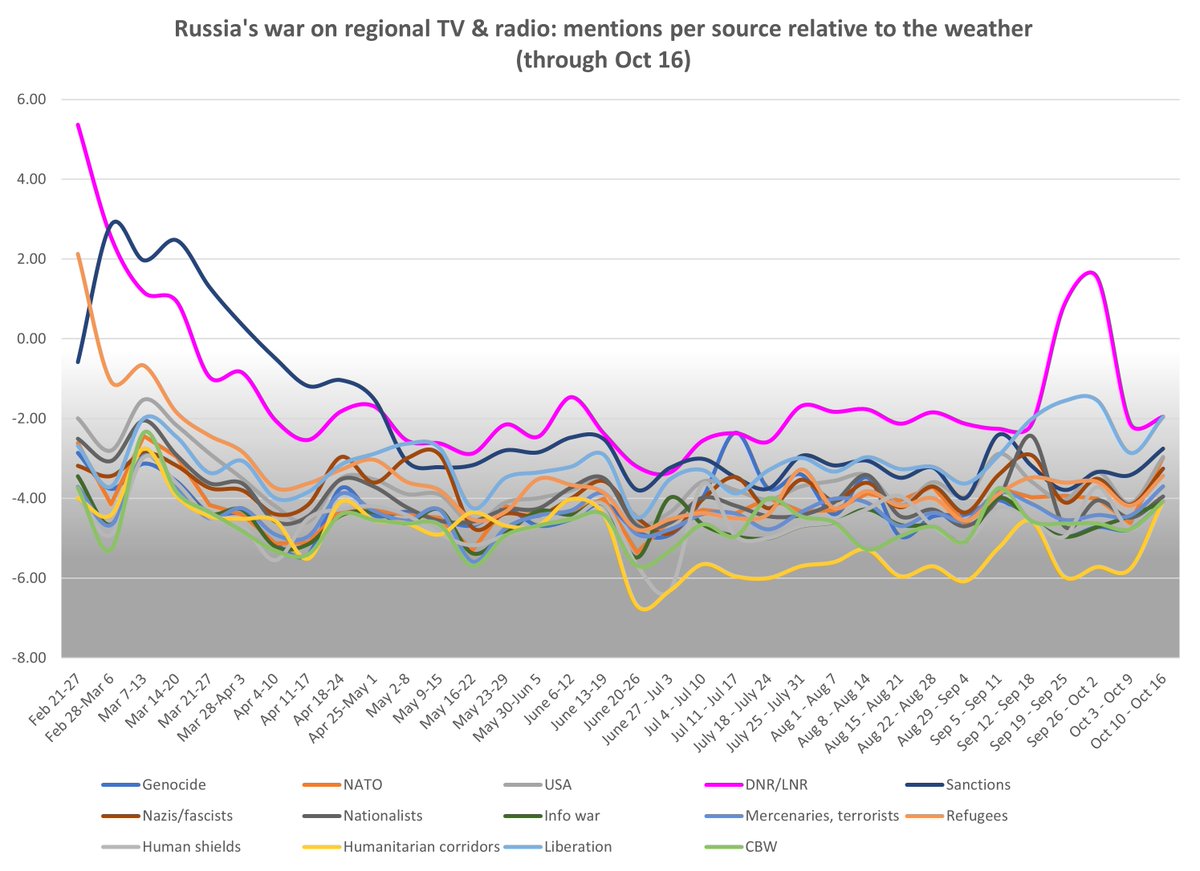Following on the attack on #Belgorod, the response of Russian state TV to the #KakhovkaDam was markedly different, with some important implications.
tl;dr it was well prepared (probably in advance), and #Russia's framing suggests it isn't very committed to occupied regions.
1/14
tl;dr it was well prepared (probably in advance), and #Russia's framing suggests it isn't very committed to occupied regions.
1/14
https://twitter.com/RuMOR_CarletonU/status/1666925709992796160
First, the attack was attributed to Ukraine from the start. The first couple of days it was chalked up to heavy artillery, supported by the claim that Ukraine regularly shelled the dam. Reports also suggested that US-supplied HIMARS were used to shell the dam.
2/14
2/14

By June 8, Russian TV stopped mentioning artillery and HIMARS and instead referred to the dam as being blown up or destroyed by Ukrainian forces/fighters/nationalists/radicals (used interchangeably). There was no acknowledgement of changing explanations for what happened.
3/14
3/14
Characterizing the attack as a terrorist act was important (as with Belgorod) for distinguishing the SMO from a war. But on Day 2, Russia's UN ambassador Nebenzya made the problematic claim that it amounted to a war crime. That's admitting that Russia's at war. Whoops.
4/14
4/14
For a while after, it was called a "terrorist act, like a war crime," until Putin chucked the playbook out the window and declared it to be an "act of barbarism." Mentions of the dam attack as a terrorist act plummeted afterwards.
5/14
5/14

Atypical for Russian TV, Day 1 framing focused on the enemy's logic! The attack was portrayed as part of Ukraine's c/offensive and a sign of its failure. It also claimed Ukraine planned for months with prior shelling and overloading the reservoir to weaken the structure.
6/14
6/14

The claim that Ukraine planned this for months was supported by a cherry-picked quote from a Washington Post article from last December and water levels in the reservoir. This is...remarkably fast research for an event that happened earlier the same day.
7/14

7/14


Day 1 also saw a smattering of claims about consequences: it was emphasized that the dam was not destroyed; evacuations weren't needed, then they were; the Zaporizhzhia nuclear plant and Crimea's water supply were not threatened; and acknowledgement of ecological disaster.
8/14
8/14

Again similar to Belgorod: acknowledging that a thing happened, but also downplaying the impact for Russians. On Day 1, the message that everything is under control was dominant, with frequent use of statements by the Mayor of Novaya Kakhovka.
9/14
9/14

By Day 2, Shoigu framed the dam attack in relation to Ukraine's counter-offensive, alleging that Ukraine sought to maximize civilian losses for Russia to compensate for its battlefield losses.
So it was planned well in advance, but also a panic move. Got it.
10/14
So it was planned well in advance, but also a panic move. Got it.
10/14
Also deserving mention: Tucker Carlson presented a gift to Russian propaganda. State TV used his claims as a springboard for decrying Western disinformation, linking the dam attack to Nord Stream and Crimean Bridge bombings, and arguing the West bears responsibility.
11/14
11/14

When compared to coverage of Belgorod, the implications are that Russia treats Kherson and other occupied regions as not fully Russian, given that a limited cross-border attack appeared far more sensitive than an unprecedented ecocide.
12/14
12/14
The willingness to undersell the scale of destruction perhaps tells us that Russia's commitment to maintaining occupation regimes in Ukraine is not particularly strong, nor does it think the Russian public cares nearly as much about Kherson as about, say, Crimea.
13/14
13/14
In sum, Russian TV was better prepared for the attack on the Kakhovka Dam than it was for Belgorod. There wasn't much narrative drift. Aside from Nebenzya's slip of the tongue, it was well a coordinated campaign.
In other words, all the makings of an inside job.
14/14
In other words, all the makings of an inside job.
14/14
• • •
Missing some Tweet in this thread? You can try to
force a refresh

 Read on Twitter
Read on Twitter












